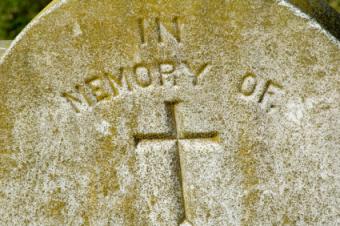
Writing an epitaph is part of putting together funeral plans. Whether you're writing your own epitaph or you're writing one for a family member, you want it to be meaningful.
How to Write an Epitaph in Six Simple Steps
An epitaph is generally a short phrase, poem, verse, or saying in honor of a deceased individual. When people speak about epitaphs, they are usually talking about headstone inscriptions, although they can also be written for obituaries and memorials.
Step 1: Highlight the Deceased Individual's Life
When writing the epitaph, you should consider the deceased individual's personality and life philosophy. Think about who they were as a person and their life's guiding principles. What kinds of things did they value? How did they live their life? It's hard to cover someone's entire life in just a few lines, so you'll want to focus on one main area to create the most meaningful impact in the epitaph. For example, someone might be remembered for:
- Humor and joking personality
- Family and faith
- Life achievements, both personal and professional
Narrowing down on what to highlight will help you come up with ideas to include in the epitaph.
Step 2: Brainstorm Ideas for Inspiration
Once you've determined where to focus your writing efforts, you need to brainstorm to come up with ideas to start writing. Favorite songs, poems, and quotes are one place to start. Other options include mentioning how the deceased passed, relationships to others, feelings about death and life, and so on. Start a running list and keep adding to it for a few days. Ask immediate family and close friends to do the same and then see where you find overlapping ideas. These words and phrases should be incorporated into the epitaph.
Step 3: Decide Whose Voice to Use
Epitaphs are often written if the surviving spouse, parent, or child wrote the lines for the deceased individual. They may also be written as if the deceased is speaking. Finally, they could be written in third person as a message to the people reading the inscription. Pick what works best based on the epitaph's focus.
Step 4: How Long Should an Epitaph Be? Consider Length
Epitaphs are generally short. They can be as simple as a phrase or a single line, or as long as six to eight lines of verse. Many are two to four lines long. The longer the epitaph, the more room you will need on the headstone, so keep this in mind as you write.

Step 5: Edit the Epitaph for Everyone
Now that the epitaph has been written, it's time to edit. Consider it from several points of view:
- Close family (parents, children, siblings, spouse)
- Friends and distant relatives
- Visitors to the cemetery, today and in 20, 50, and 100 years
If the epitaph makes sense to all three of those groups of people, then it is good to go. Avoid using abbreviations, inside jokes, references to trends, or passing phrases that won't hold up as time goes by.
Step 6: Wait Before Finalizing the Epitaph
The most meaningful epitaphs are ones that people read and are immediately reminded of the deceased individual. They should evoke a response, but not an overly emotional one. Additionally, you'll want to avoid cliches. For these reasons, it's best to wait until you have processed your grief before finalizing and adding the epitaph to the headstone or marker. It's also a good idea to run the epitaph by close family and friends for a second opinion, too, once you feel it is ready.
Epitaph Examples With Feeling
Reading examples of other epitaphs help you write one that is meaningful for yourself or your loved one.
Meaningful Short Epitaph Samples
These are short epitaphs written by author Amy Hoover that convey meaningful sentiments:
- For anyone - "In life, he loved all of us. In death, we love him still."
- For anyone - "The memory of your smile brings joy to our souls. You are missed and you are loved, always."
- Death of a spouse - "You were my world, my life, my everything. Peace to you, dear Wife/Husband, and I will see you in the great beyond."
- Death by illness - "May he be granted the rest in death that he desired in life. May peace be with you, Deceased Name."
- Death of a baby or child - "We held you in our arms for [minutes/hours/days/short years], but you are held in our hearts for a lifetime. God bless you, little angel."
- Your own epitaph - "May your hearts be full and your lives be long. Until I see you again, may you live as if I will see you tomorrow."

More Epitaph Examples
Additional ideas for writing an epitaph include:
- Memorable epitaph examples are ones that use common but loved phrases, film and literary references, and poetry to convey meaning.
- Just because an epitaph is short doesn't mean it can't be meaningful. Personalize it to fit the deceased individual's role in life.
- Funny headstone sayings are also appropriate if the deceased enjoyed humor. Meaningful epitaphs don't have to be somber; a funny epitaph can convey meaning, too.
- Use simple words on a headstone to plainly tell everyone who the deceased was and what s/he meant to you.
Writing a Meaningful Epitaph
The epitaph selected will be around for hundreds of years. Therefore, you'll want to put a little extra time and consideration into writing one before making your final decision.







